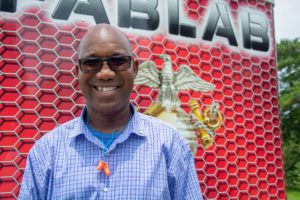 NEW BERN — It has been said that teachers are preparing students for careers that do not yet exist. I believe this to be true.
NEW BERN — It has been said that teachers are preparing students for careers that do not yet exist. I believe this to be true.
In our rapidly changing society, many of the careers that we know of today will most likely not exist in 10 years. In addition, those that do, may be performed differently. The only careers that are safe from automation will be ones that rely heavily on critical thinking, collaboration, communication, and creativity — known as: the “Four Cs of 21st Century Learning.”
The three weeks that I spent — at the Fleet Readiness Center East at Marine Corps Air Station Cherry Point — observing how engineers communicate and approach problems inspired me to create lessons based on “real world” applications and solutions. I am designing a series of lessons and activities that will challenge my English as a Second Language students to tackle a real problem, research it, and report their findings to a real audience.
My English learners will investigate the effects of zero-gravity on the germination of tomato plants. The students will then design a container to house tomato seeds and collect data on how the seeds germinate. Because of the connections I have made through the Kenan Fellows Program for Teacher Leadership, I will use resources provided by the Fleet Readiness Center’s Fab Lab. Inside the lab, students will be able to use 3-D printers and laser cutters to design and assemble their planters.
In addition to learning how to use the engineering design process, students will improve their language and communications skills through group discussions about their scientific observations. The project will culminate with a STEM career night in which students will present the results of their experiments to parents and members of the community. Engineers and representatives from the Fleet Readiness Center will be in attendance as well to provide information about STEM careers.
This opportunity has made me more aware of STEM career opportunities in our community and I am excited about all of the ways I am now able to inform students. I have made so many new connections and have networked with experts who can help me to incorporate authentic STEM activities into my classrooms.
The internship combined with the Kenan Fellows Program Summer and Fall Institutes have taught me so much from project-based learning to culturally-responsive teaching. At first, I felt like it was just too much. Then, I thought of the river, we visited as part of the Summer Institute, and how the moving water increases the dissolved oxygen of the stream so life can happen. I began to feel like a rock in the stream with water gently flowing over and around it.
The information I have received through this program has flowed endlessly over and around me. But, as I reflect on my experience, ideas have emerged about how I can incorporate all of these new strategies into my lessons and in my classes. This experience has changed me and challenged my thinking. From now on, I will add as much “dissolved oxygen” as possible to my lessons so that “new life” will continue to happen.
Anthony Nesbit, a 2018-19 Kenan Fellow, is an English as a Second Language Teacher with Craven County Schools. His fellowship is supported by the Kenan Institute for Engineering, Technology & Science Board of Trustees and Kenan Fellows Program for Teacher Leadership Board of Advisors.